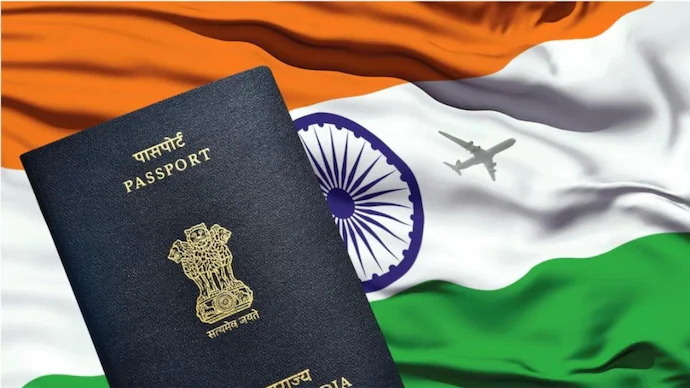Citizenship comes first today in our crowded world. No man can enjoy the privileges of education and thereafter with a clear conscience break his contract with society. To respect that contract is to be mature, to strengthen it is to be a good citizen, to do more than your share under it is noble.
-Isaiah Bowman
Introduction
These days in the Indian context citizenship is much debated about. So, it becomes important to discuss what is citizenship, why does it matter, its origin and where it is enshrined. citizenship is enshrined in the Indian Constitution (the Bible of Indian legal System). Articles 5 to 11 discuss about the ways a person can gain Indian citizenship in the Indian citizenship act of 1955. Citizenship is not only a legal status given to a person but also a dynamic relationship between the individual and the state that encompasses rights, responsibilities, participation, and identify. Citizenship is significant for both a person and a state as it protects the socio-economic interests. Citizenship gives birth to the rights and duties of each person. We understand the term citizenship in many ways varying from their application. According to Cooper, “Citizenship is the status and the role which defines the authority and obligation of individual members of a community. This status and role may be formally codified in terms of qualification, rights and obligation by constitution, laws or informally determined by values and tradition.” Citizenship can be understood as the relation between the individual and the state to which the individual owes allegiance and in return is entitled to security and protection. The Citizenship is of utmost priority not only to a person but also to a state. It is truly said that right comes with a duty same is the case with citizenship. The origin of citizenship dated back to the towns and cities of Greece, where it applied only to the rich and powerful and women, slaves were left out of this concept. Earlier, a citizen was eligible to vote, liable for military service and taxation laws. But this concept has moulded now to a great extend as citizenship demand obedience, allegiance to their country and in return entitles them benefit in every aspect of their life. The citizenship nowadays is not an ordinary concept, it has many more concepts attached with it constitutionality, politically, economically and socially.
Let’s discuss the origin of the question whether the citizenship is a human right or something to be earned. The most controversial and burning issue of the year i.e. CAA has sparked various protest all over the India and it led to the contemplation among the people. People started thinking about it deeply and now to go into the roots of this question it becomes necessary to understand the issue from where it is coming.
THE CONSTITUTION AMENDMENT ACT, 2019
At the first hearing of the word citizenship what immediately strikes our minds is the most controversial and debated amendment till date in India is the citizenship amendment act 2019. This amendment broke out protests and violence across India. So, this amendment herein this context becomes essential to discuss. But before discussing the act we need to know the background and it would be incomplete without mentioning Nehru – Liaqat pact of 1950. This pact was signed between the then Indian prime Minister Pt. Jawaharlal Nehru and the Pakistani Prime minister Liaqat Ali Khan on April 8, 1950. This pact is also known as “DELHI PACT”. The pact confirmed the rights of minorities in both the countries. This pact also covers both Afghanistan and Bangladesh as Bangladesh was a part of Pakistan till 1970 and Afghanistan was the part of undivided India. Now, the citizenship amendment act seeks/ aims to provide Indian citizenship to Hindus, Silks, Jains, Buddhists, Parsi and Christians in Muslim majority countries namely, Pakistan, Afghanistan and Bangladesh. These 6 communities are facing religious persecution in the abovementioned countries.
The legislation applies to those who were “forced or compelled to seek shelter in India due to persecution on the ground of religion”. It aims to protect such people from proceedings of illegal migration. The cut-off date for citizenship is December 31, 2014 which means the applicant should have entered India on or before that date. Indian citizenship, under present law, is given either to those born in India or if they have resided in the country for a minimum of 11 years. The Bill also propose to incorporate a sub-section (d) to Section 7, providing for cancellation of Overseas Citizen of India (OCI) registration where the OCI card-holder has violated any provision of the Citizenship Act or any other law in force. Let’s now discuss the validity of the constitutional amendment act, 2019 by implementing the test which was laid down in Article 14 of the constitution. In order to check the legality of a legislation we have a two-fold test:
- Test of Reasonable Classification
- Test of Non-Arbitrariness
Article 14 of the constitution states that every person is equal before the law meaning thereby that equals must be treated equally not unequal one. Our constitution follows the concept of checks and balances and keeps a persistent check on the three officials i.e. Legislative, executive and judiciary by way of any authority. So, a mere possibility that a law may be abused is not a ground to declare it unconstitutional. It means that state cannot discriminate between persons; otherwise such a state action becomes void. It creates boundary for state actions, there is an interpretation not exception to this rule that equal must be treated equally not the unequal ones. State has to make laws for the betterment of the unequal and it does not cross its boundaries. Supreme Court of India in 1981 in the case of Ajay Hasia v. Khalid Mujib Sehravardi laid down the test of reasonable classification under Article 14:
In order, however, to pass the test of permissible classification two conditions must be fulfilled, namely, (i) that the classification must be founded on an intelligible differentia which distinguishes persons or things that are grouped together from others left out of the group and (ii) that differentia must have a rational relation to the object sought to be achieved by the statute in question. The classification may be founded on different bases; namely, geographical, or according to objects or occupations or the like. What is necessary is that there must be a nexus between the basis of classification and the object of the Act under consideration. It is also well established by the decisions of this Court that Article 14 condemns discrimination not only by a substantive law but also by a law of procedure. The contention now put forward as to the invalidity of the trial of the appellants has, therefore to be tested in the light of the principles so laid down in the decisions of this Court.
As the Constitution, acknowledge that inequality exists in society and to provide equal treatment to unequal persons would amount to injustice, so it permits a state action which is discriminatory provided that such differentiation is based on an “ Intelligible Differentia” and such differentiation has a rational nexus with the objective sought to be achieved by the state action. So, to test CAA it has to pass the Test of Reasonable classification: –
I) Intelligible Differentia
This law makes two groups one consisting person belonging to Hindu, Sikh, Buddhist, Jain, Parsi or Christian community from Afghanistan, Bangladesh or Pakistan and second person belonging to Muslim community in these countries. This means that it creates distinction between two groups restricted to only three countries where Islam is the official religion of these states where the said communities are in minority, and the said minorities faces persecution on the basis of religion and the differentia becomes reasonable on humanitarian grounds.
II) Reasonable Nexus
The objective and the reason of this amendment is that the minority community facing prosecutions there and the person have fled to India to seek shelter and have continued to stay in India. This only provides relaxation to the person of specified group who form minority in the given countries and it expedites the process of acquiring citizenship by way of naturalization. The amendment does not prohibit person from Muslim community from applying citizenship. The position of foreign Muslims remains unchanged and only a relaxation is given to foreign persons belonging to minority group which makes this law with reasonable objective.
Later in 1959 in the case, Neelima Mishra v. Harinder Kaur Paintal, Supreme Court text ended this test to check law under Article 14, Test of non-arbitrariness, which says that there must be reasonable classification, secondly, the law if not make classification and it leave it to the discretion of the administration to select or classify a person or thing to whom the law apply, it must have principles on which the application will be based and lastly the executive action if fails to adhere by the legislation, the executive action is unconstitutional but not the legislation.
CAA qualifies all three of them, because the law provides reasonable classification as proved above, secondly the law make and set apart the classes in step with the requirements and exigencies of the society. the legislative policy is obvious and definite because it clearly classifies the person to incline citizenship and there’s no have to have a good method of finishing up that policy as discretion isn’t vested by the statute upon a body of administrators or officers to create selective application of the law to certain classes or groups of persons, and lastly the chief action won’t make law unconstitutional so it upholds all the test. As CAA 2019 is responded to a sound process by the parliament it doesn’t create invalidity on the procedural part. Article 14 lead down two tests: first is Test of reasonable classification and second is that the Test of non-Arbitrariness, and both of those tests are elapsed this legislation. Although Supreme court is receptive check the arbitrariness of the legislation and even various writ petition has already been filled within the Supreme court.
THE CONTROVERSY
Situation In India
Since India has the population over 133.92 crore, India has never failed to help the countries in times of distress. India was the 1st country to provide relief to Rohingyas who rushed to India in millions. India has also provided help to Tamilians in south who came from Sri Lanka also saw a huge influx from Tibet as well. Seeing that much of illegal undocumented immigration into our country, it is a probability that India in future will convert into a refugee land if this continues to happen. The current scenario unfortunately indicating towards such a situation. So, this aspect of our country should be kept into mind before enacting a legislation & also before protesting or supporting a parliamentary legislation made bona fidely.
Exclusion Of Minority Within Islam
The recent uproar on the constitutional amendment act 2019 has flagged the issue of exclusion of minority within Islam and questioned its validity. Maintaining the validity of the concerned act here’s a presentation of two-fold argument that will further support its lawfulness. Firstly the “Shias” not even today are considered as minority groups in Pakistan by their government. Secondly, the question about the exclusion of minority groups “Ahmadis” is also valid as seeing in the context of Nehru-Liaquat pact of 14 April, 1950 where both the countries agreed to protect the minority groups, Ahmadis were added as the minority groups through the Second Amendment to the constitution of Pakistani Constitution in 1974. So, both my arguments substantiate the exclusion of certain minorities and constitutionality of the CAA.
CONCLUSION- A HUMAN RIGHT OR SOMETHING TO BE EARNED?
Human Right
Now comes the bone of contention whether the citizenship is a Human right or it is something to be earned. First and the foremost thing is to take cognizance of the meaning “Human Right”. Human rights simply are the rights that belongs to every individual only because of them being a human. These rights are inherent in a human being. Because human rights are not provided by any external authority such as government, monarchy or any religious authority so there are not as same as civil or constitutional right as provided in Bill of Rights or in the U.S or Indian Constitution.
Citizenship cannot be a human right Firstly, because human rights are inalienable and cannot be detached from an individual. This concept of human rights lacks practicality as it is not compatible enough with the Indian concept of Citizenship i.e. single citizenship and termination of Indian citizenship on acquiring another country’s citizenship. So, the concept of inalienability stands negated as it can be snatched or detached according to the procedure established by law. Secondly, as abovementioned human rights are not given by any political or religious authority and they are inherent in a human being but this is not the case in citizenship. It is provided by an external authority and is not imbibed in them from birth. The person in order to acquire citizenship has to follow the due process to be eligible as a lawful citizen.
Something To Be Earned
The meaning of this line lies in itself and ex-facie which reflects the idea of something being earned by action rather than for free. To substantiate my contention a three- fold arguments will be presented.
Firstly, our people have a genuine lack of interest in the fact that they have earned something by birth right. It is a well-established fact that when we earn something, we are cognizant of the rights and duties coming along with it. We value more what we earn through hard work and take it for granted what we get for free in our lives especially in the case of India. Secondly, the condition of population explosion in India is getting worse and will get worst if there will be no criteria to determine the citizenship of a person in a country. India already has the second largest population in the world after china and moreover it doesn’t follow any measure to tackle this enigma like one-child policy like China. Citizenship must be earned because until now every citizen has earned it by following the due process mentioned in the constitution of India either by birth or by naturalisation as mentioned in the living document. Thirdly, it is a well-established fact that huge influx of people from one place to another will obviously going to hamper their economic, political and social opportunities and dilute the rights of people living there. In a big democracy like India where there are lakhs of immigrants living here illegally and undocumented, a legal way or a pathway to earn the citizenship must be encourage so that they come out of the shadows.
Citizenship is a matter of pride for the citizen because when he says that “I am a citizen of this country” he is conscious of the duty he has for the country. Hence, it is as clear as mirror that why citizenship should not be a subject of human right instead it should be earned by fulling the criteria and procedures laid down by the government.







Very Informative